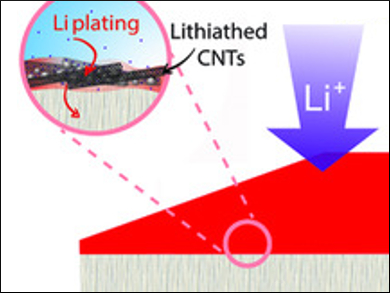Lithium-ion batteries are very commonly used in portable electronics. Using lithium metal anodes could improve their capacity, but can also lead to the growth of Li dendrites during charge/discharge cycles. These metal dendrites can cause short-circuits in the batteries. This is a serious safety hazard.
James M. Tour, Rice University, Houston, TX, USA, and colleagues have developed a lithiated multiwall carbon nanotube (Li‐MWCNT) interface for the prevention of dendrite growth on Li metal anodes. The team first prepared freestanding MWCNT films by dispersing MWCNTs in N‐methyl‐2‐pyrrolidone (NMP) and filtering the suspension. The MWCNT film was then lithiated by wetting it with a highly concentrated electrolyte and placing it on top of a Li metal foil.
The Li‐MWCNTs act as a controlled Li diffusion interface (pictured), which suppresses the growth of Li dendrites by regulating the Li+-ion flux during the battery’s charge/discharge cycles. The interface also acts as a protective physical barrier against side reactions that can occur on the Li surface. The researchers tested the material in an Li‐S cell, which was stable over 450 charge/discharge cycles with coulombic efficiencies close to 99.9 %
- Suppressing Li Metal Dendrites Through a Solid Li‐Ion Backup Layer,
Rodrigo V. Salvatierra, Gladys A. López‐Silva, Almaz S. Jalilov, Jongwon Yoon, Gang Wu, Ah‐Lim Tsai, James M. Tour,
Adv. Mater. 2018.
https://doi.org/10.1002/adma.201803869


